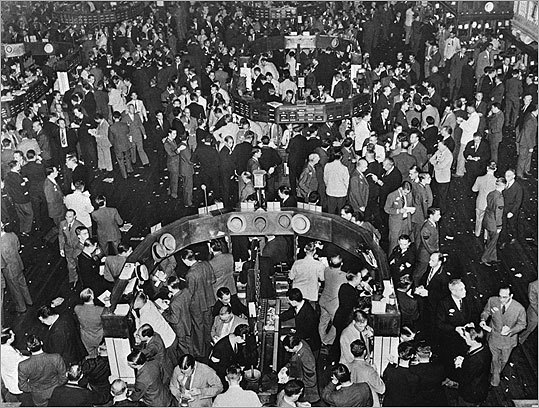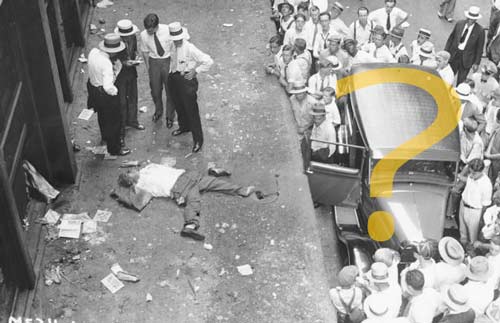Great depression stock market suicides
The Great Depression was a worldwide economic slump that began as an American crisis. The s was a boom decade for American companies, which tallied up record production figures, ever-increasing sales and millions of dollars profit.
These profits meant high dividends and increasing share prices, which encouraged investment in shares. Some sold what they had or borrowed heavily to purchase shares.
Few seemed to believe the boom would end — but it inevitably did. The trigger was industrial and agricultural over-production: American companies had grown so rapidly that by the late s they were making more goods that could be bought by consumers.
This in turn led to falls in sales, prices and profits.
Share owners began panic-selling, which caused prices to drop further. This trend continued for three weeks. On two consecutive days in late October, the entire stock exchange lost almost one-eighth of its value. The Dow Jones, a statistic showing the average share prices of major companies, had peaked at The Wall Street crash had disastrous effects on the US economy.
Between andAmerican industrial production fell by 45 per cent.

Many companies were bankrupted or ceased trading; others attempted to cut costs by releasing workers. The result was mass unemployment; bymore than 12 million Americans were out of work. The collapse in economic confidence fuelled a run on banks, as people rushed to secure their savings.
Hundreds of banks also closed and many lost cash investments and savings.
Great Recession - Wikipedia
The Great Depression had profound effects on American society. With no system of state welfare, the jobless were forced to rely on charity. Others scavenged for scraps in dustbins and rubbish heaps. Between and hundreds of Americans starved to death. The jobless often became homeless, with more than a million people evicted from their homes.
In alone there were 23, suicides in the United States. There were knock-on effects around the world, with few developed nations spared at least some economic misery. British unemployment more than doubled to 2. In Australia the demand for wool and food exports slumped, along prices, wages and unemployment.
By almost 30 per cent of Australian workers were without a job. The impact on Weimar Germany was even more dire. Germans were not so much reliant on exports as they were on American loans, which had been propping up strategy binary option for dummies pdf Weimar economy since No further loans were issued from latewhile Best pharmaceutical stock to buy financiers began to call in existing loans.
Despite its rapid growth, the German economy was not equipped for this retraction of cash and capital. Banks struggled to provide money and credit; in there were runs on German great depression stock market suicides Austrian banks and several of them folded.
In correlation trade forex US, the largest purchaser of German industrial exports, put up tariff barriers to protect its own companies. German industrialists lost access to US markets and found credit almost impossible to obtain. Many industrial companies and factories either closed or shrank dramatically.
By German industrial production was at 58 per cent of its levels.
The effect of this decline was spiraling unemployment. By the end of around 1.
Frugal Lessons from People Who Survived the Great Depression - Frugal Confessions
By early unemployment in Germany had reached a staggering six million. The effects this unemployment had on German society were devastating. While there were few shortages of food, millions found themselves without the means to obtain it.
The children suffered worst, thousands dying from malnutrition and hunger-related diseases. Millions of industrial workers — who in had become the best-paid blue collar workers in Europe — spent a year or more in idleness. But the Great Depression affected all classes in Germany, not just the factory workers. Unemployment was high among white-collar workers and the professional classes.
British novelist Christopher Isherwood, who lived in Berlin during the worst of the richest stock broker, described its scenes:. Morning after morning, all over the immense, damp, dreary town and the packing-case colonies of huts in the suburb allotments, young men were waking up to another workless empty day, to be spent as they could best contrive: The Weimar government failed to muster an effective response to the Depression.
Rather than ramping up spending, Bruning decided to increase taxes to reduce the budget deficit; he then implemented wage cuts and spending reductions, an attempt great depression stock market suicides lower prices. They also revived government instability and bickering between parties in the Reichstag. With public discontent soaring, membership of the NSDAP grew to record levels.
In September the NSDAP increased its representation in the Reichstag almost tenfold, winning seats. Two years later they won seats, the most won by any single party during the entire Weimar period. Hitler found the failures and misery of the Great Depression to his liking, remarking: For hard reality has opened the eyes of millions of Germans. The Great Depression was triggered by a collapse in US share prices inafter a decade-long economic boom.
It led to years of economic downturn in developed nations, as businesses closed or cut back by shedding workers. Unemployment was the most noticeable effect of the Depression; in Germany it put six million men out of work. The Bruning government failed to respond effectively, passing tax increases and cutbacks rather than spending.
Public dissatisfaction with the economic conditions and the government led to a dramatic increase in voter support for Hitler and the NSDAP, who became the largest party in the Reichstag.

Content on this page may not be republished or distributed without permission. For more information please refer to our Terms of Use. This page was written by Jennifer Llewellyn, Jim Southey and Steve Thompson. To reference this page, use the following citation: The young Weimar Republic was wracked by armed street fighting waged mainly between Communists and Nazis. Foreclosures, bankruptcies, suicides and malnourishment all skyrocketed.
Six million Germans, 40 per cent of the working population, were unemployed; and thousands found themselves without a place to live… As anxiety and fear gripped the masses of unemployed men, blatant prejudices resurfaced against full-time female workers.
Women were urged to give up their jobs and return home to their traditional roles as wives and mothers.
Man Commits Suicide Due to the Local Stock Market CollapseSome of them gladly complied. Others were despondent, either because of their financial need to work or because they worried that the few advances made by women would be permanently stifled. American Revolution French Revolution World War I Russian Revolution Nazi Germany The Holocaust The Cold War Chinese Revolution The Vietnam War Northern Ireland Past Peculiar. We therefore rely on revenue from online advertising to cover costs, maintain our website and fund the creation of new resources.